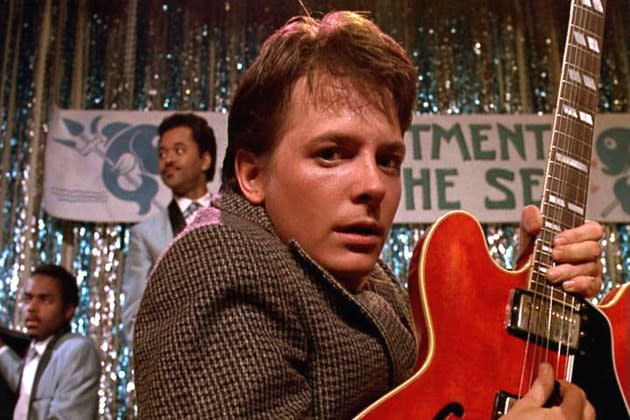The ‘Back to the Future’ Musical (Mostly) Cuts Marty’s Appropriation of Chuck Berry
- Oops!Something went wrong.Please try again later.
- Oops!Something went wrong.Please try again later.
- Oops!Something went wrong.Please try again later.
- Oops!Something went wrong.Please try again later.

Movies or life stories that are transformed into Broadway musicals always take a degree of liberties with their source material. Sometimes they’re egregious (Hey, Cher musical people, Gregg Allman didn’t sing “Ramblin’ Man” — Dickey Betts did!); other times they may be an improvement. The latter is sometimes the case in Back to the Future: The Musical, which opened last week and time-travels the 1985 blockbuster starring Michael J. Fox as Marty McFly onto the 2023 Broadway stage. Beloved artifacts like Marty’s down vest, Doc Brown’s souped-up DeLorean, and that banging theme song “The Power of Love” all make the jump, but (spoiler alert!) other, shall we say, more problematic scenes were cut or altered. Here’s what we noticed from the seats:
Marty McFly, a white teenager, is no longer responsible for a rock & roll classic written by a Black pioneer.
In the movie, Eighties Marty is a wannabe rock star, but when he’s transported back to 1955, he gets to live out his fantasy at the school dance. As we all recall, the guitarist in the band injures his hand, so Marty borrows his instrument and leads the all-Black band through a romp of Chuck Berry’s “Johnny B. Goode,” which the crowd has apparently never heard. (In the real world, Berry had already released “Maybellene” and “Roll Over Beethoven,” but “Johnny B. Goode” wouldn’t arrive on record until 1958.)
More from Rolling Stone
Lin-Manuel Miranda to Adapt 'The Warriors' Into a Stage Musical
Hollywood Actors Are Striking. But on Broadway, the Show Must Go On.
The band member — “Marvin Berry” — is seen calling his “cousin” in the movie and holding up the phone so that Chuck could hear this mysterious kid play this rollicking new song. The implication, of course, was that rock & roll was invented by — Marty McFly. That wasn’t a good look in 1985, and it’s an even worse one now. The performance is replicated in the stage production, but even though Marty still plays “Johnny B. Goode,” that unfortunate phone call has gone the way of landlines.
Charles Berry Jr., Berry’s son, says he was unaware that the telephone gag was cut from the musical version. But according to Berry, neither that scene from the movie, nor anything else about the cinematic Back to the Future, bothered his father or anyone in the family, and he laughs off the appropriation accusations. “In my perspective, I know the facts,” he says. “My family knows the facts. The world knows the facts. It’s a movie. We didn’t think of any appropriations, didn’t think it was any rip-off. In fact, our stance was, ‘This is fantastic! Nearly 30 years later, this is in a movie!’ You can’t beat that.” Four decades on, though, Berry does still have to field questions about his dad’s fictitious “cousin Marvin.”
The Middle East caricatures of Libyan terrorists have been removed.
Other than the quintessential high school bully Biff, who’s like Shrek’s evil twin, the villains in the Back to the Future movie were Libyan terrorists, depicted as Middle Eastern caricatures in a VW van who seek revenge on Doc for bilking them out of their plutonium. When they find him, they shoot him dead.
In the musical, any and all international bad guys have been vanquished, and Doc’s life is now threatened after having accidentally touched the nuclear material while he was fueling the DeLorean. So does this mean that Doc might die not at the hands of terrorists but by the man who helped unleash nuclear power — J. Robert Oppenheimer? Now that’s a Broadway sequel we want to see.
We get a whole lot more Goldie.
When Marty first drops into the soda shop in 1955, he inspires janitor Goldie Wilson to think about campaigning for mayor. We barely see Wilson again, but in the musical, the character receives extended scenes in the past and present, as well as a crowd-pleasing production number, “Gotta Start Somewhere.” In the latter case, the change is a big win, with actor Jelani Remy throwing himself into the song with all-out stage-show gusto.
George McFly gets an extreme makeover.
In a change-up that likely won’t make Crispin Glover happy, Marty’s dad, a pathetic jellyfish of a man in the Fifties, is transformed into a successful (and wealthier) author after Marty zips back to the present. In an interview with the AV Club in 2012, Glover, who played George in the film, said as much: “I think there would be a better message if … instead the reward was that the mother and father characters are in love with each other. And that there’s the potential that money comes in.”
George’s overhaul is jacked up even more in the musical. When Marty returns to 1985, he learns that Hill Valley is having a “George McFly Day” to celebrate his dad and his bestselling sci-fi book. In the movie, that book was titled A Match Made in Space. Now it’s — surprise! — Back to the Future.
But the Oedipal romance remains.
For all the changes that BTTF: The Musical enacts, one key plot point that’s skeeved out viewers for decades remains: Lorraine, who doesn’t realize Marty is her flesh and blood, continues to have the hots for her son. Onstage, those scenes still play a little creepy, even if they’re presented in an innocuous enough way and with enough facial mugging from the musical’s star Casey Likes to pack a vintage sitcom. But there’s really no way around changing it: No matter how icky that plot point felt in 1985, there’d be no movie — or musical — without it.
Best of Rolling Stone
